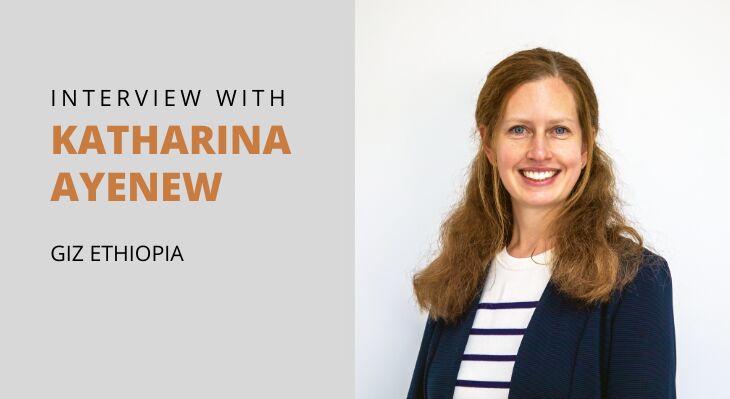Ethiopia – more employability through targeted training
Interview with Katharina Ayenew from GIZ
10.11.2023
Katharina Ayenew works as a GIZ Team Leader in Ethiopia. In this brief interview, she speaks about current topics in international vocational education and training cooperation, about her work at GIZ and about her time at GOVET.

You have been working in Ethiopia as a GIZ advisor and Team Leader for the Sustainable Training and Education Programme (STEP) since the end of 2019. You and your colleagues are committed to making it easier for people in Ethiopia to find work. What challenges do you face?
Ethiopia is a very populous country of more than 100 million inhabitants. The population is very young, and consequently several million children crowd into the school system every year whilst the same number of young people leave to seek employment on the labour market.
In principle, this is a very favourable starting point in demographic terms because the Ethiopian economy needs well trained workers. Companies are looking for employees who offer soft skills such as punctuality, service orientation and customer focus whilst also having the professional competency needed to take care of the tasks at hand. In order to be able to cover this requirement for a qualified labour force and to train skilled workers within the country itself, the Ethiopian government wishes to strengthen its vocational education and training system.

However, the willingness of companies to provide training is a major challenge in this regard. It is not easy to persuade them to train young people. Over recent years, the Ethiopian government has been working in cooperation with Germany to try to ensure that more companies participate in training. But the reality is that it remains difficult to integrate the private sector. This means that large parts of training still take place at schools rather than in companies.
The training of VET staff is another area in which we are attempting to make adjustments. Pupils at vocational schools frequently only learn theoretical knowledge since many teachers do not themselves have the requisite practical experiences that would enable them to impart the necessary skills to their trainees. Company-based trainers also lack the necessary knowledge to teach the young trainees the competencies they need.
What are the current main focuses of your advisory work?
STEP takes a multi-level approach and works with different target groups to support our Ethiopian partners in establishing a more effective vocational education and training system. One emphasis is closer integration of the private sector into the VET system. The STEP Team advises the Ethiopian government how trade and industry can be involved in important developments (e.g. the drawing up of new strategies).

STEP is also providing direct support for several training models. These are being piloted in four regions of the country. One focus here is the involvement of the private sector. In specific terms, this means that STEP offers continuing training both to school-based teaching staff and to trainers at the companies. Knowledge and experiences with regard to how to deal with trainees are imparted and shared, but the main emphasis is on good cooperation between the various stakeholders. Effective coordination is an important foundation for the preparation of a common training plan which is also implemented jointly.
As a former Project Head at GOVET, you advised ministerial and institutional partners. Which of the experiences you gained from your work at GOVET can you now use in your current tasks?
When I was at GOVET, I advised Ghana, India, Greece and Latvia on vocational education and training. As part of these activities, I engaged in a great deal of specialist networking with colleagues from the Federal Institute for Vocational Education and Training (BIBB) and thus gained deeper insight into German VET. I also learned a lot about the vocational education and training systems of other countries during my three and a half years at GOVET. I am now able to pass on this knowledge to my partners in Ethiopia. My experiences with GOVET at BIBB therefore offer a very good basis for providing targeted advice to partners on the ground.
I also have recourse to a strong network – connections which were made during my time at BIBB. During the initial period of the coronavirus pandemic, which was extremely arduous, STEP organised a number of online formats together with experts from BIBB, and these have helped the partners with capacity building. This also led to greater awareness of BIBB as an institution on the part of Ethiopian ministry officials, who are now actively endeavouring to enter into cooperation with the Federal Institute.
To what extent do you continue to make use of provision from GOVET?
I’m a big fan of the GOVET materials and still integrate them into partner consultancy. Shorter clips in particular, such as the video on “Employability orientation in vocational training” serve as very good inputs for workshops with partner specialists.
Digital and sustainable transformations are changing initial and continuing vocational education and training. Why is vocational education and training so important in times such as these?
Vocational education and training will continue to play an important and crucial role in the future. It makes a key contribution to social cohesion and to economic development in every country. Every country needs well educated and well trained young people and young adults.
Ethiopia has set itself the goal of becoming a “middle-income country” over the coming years. Accordingly, the objective is to strengthen Ethiopian industry in order to create greater prosperity. This will, however, only work if companies (regardless of whether state-owned or private) are able to gain access to well trained (young) skilled workers. At the same time, Ethiopia requires a good education system and needs to reduce its youth employment so that young people can enjoy better prospects. Greater satisfaction and stronger cohesion in the population will assist in the prevention of conflict. This is especially significant in a multi-ethnic state such as Ethiopia, since conflicts and military skirmishes can very rapidly eradicate hard-won prosperity.

Digitalisation is also a major topic here in Ethiopia. For this reason, STEP is working on the digitalisation of core processes in VET in conjunction with the partners. One example here is the enrolment of trainees at vocational schools. In Ethiopia, trainees register at vocational schools, whereas in Germany a training contract is concluded with a company. Enrolment in Ethiopia mostly still takes place manually, and this means that trainees have to turn up at the school itself. The aim is for a digital registration system to make this easier. Work is also ongoing to introduce digital media into training with a view to making learning more attractive, more successful and maybe even more resource-efficient.
The “Strategy of the Federal Government for one-stop international VET cooperation” was adopted almost ten years ago. This sets out the framework for coherent and complementary implementation by the stakeholders involved in the process. How effective is the strategy proving to be at the implementation level, and how is it making its presence felt in your work specifically?
Ethiopia is an important country for German development cooperation. One reason is the country’s geographical position and its status as seat of the African Union. A second factor is the need for support. A multitude of both German and international stakeholders are therefore cooperating with Ethiopia.
Germany has assumed a pioneering role with regard to VET cooperation and is very well known to the relevant partners. This comes as a result of major projects instigated by the Federal Ministry for Economic Cooperation and Development (BMZ), some of which are co-financed, and smaller projects which are executed by individual German associations, for example. Of course, the important elements here are collaboration and harmonisation, so that everyone is “pulling together”. In my view, this is already happening very effectively in many areas. For example, STEP acts in concert with other donor countries such as Italy, with German foundations based in Addis Ababa and also with smaller projects including the BMZ’s Partner Africa Project, which is managed by sequa and implemented by the North Rhine-Westphalia construction associations. This produces good synergy effects which ultimately benefit our Ethiopian partners.
Background
Ethiopia is currently undergoing dynamic and radical change characterised by extensive political and economic reforms. These new developments are also having an impact on vocational education and training and on education at universities of applied sciences in the country with the second largest population on the African continent. The objective of STEP (Sustainable Training and Education Programme) is for vocational school leavers, graduates from universities of applied sciences, and job seekers to find it easier to participate in working life or enter self-employment. It is seeking to achieve closer collaboration between the education system, trade and industry, and the healthcare system in order to align the VET and universities of applied sciences system more directly to the requirements of the economy.